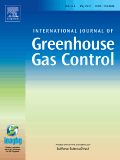
International Journal of Greenhouse Gas Control
Scope & Guideline
Advancing solutions for a sustainable future.
Introduction
Aims and Scopes
- Geological Carbon Storage:
Research on the geological formations suitable for CO2 storage, including assessments of storage capacity, leakage risks, and monitoring techniques. - Carbon Capture Technologies:
Development and optimization of technologies for capturing CO2 from various sources, including post-combustion, pre-combustion, and direct air capture methods. - Process Optimization and Modeling:
Use of computational and experimental methods to optimize the performance of carbon capture and storage systems, including modeling of CO2 behavior in geological formations. - Environmental Impact Assessments:
Studies evaluating the environmental implications of carbon capture and storage projects, including life cycle assessments and public perception. - Policy and Regulation:
Analysis of the regulatory frameworks and policy instruments that govern the deployment of CCUS technologies, including economic incentives and barriers. - Innovative Materials and Solvents:
Exploration of new materials and chemical solvents designed to enhance the efficiency and sustainability of carbon capture processes. - Socio-technical Dynamics:
Investigations into the societal implications of CCUS technologies, including stakeholder engagement, public acceptance, and ethical considerations.
Trending and Emerging
- Machine Learning and AI Applications:
There is a notable increase in research employing machine learning and artificial intelligence techniques for optimizing carbon capture processes, predicting CO2 behavior in geological formations, and enhancing monitoring systems. - Integration of Renewable Energy with CCUS:
Emerging studies focus on the synergy between renewable energy sources and carbon capture technologies, exploring how these systems can work together to achieve net-zero emissions. - Advanced Monitoring Techniques:
Innovations in monitoring technologies, such as real-time data acquisition and remote sensing, are gaining traction, enhancing the ability to track CO2 plumes and ensure storage integrity. - Circular Economy Approaches:
Research is increasingly exploring how CCUS can fit into circular economy frameworks, emphasizing the reuse of captured CO2 in industrial processes and the creation of value-added products. - Public Engagement and Acceptance:
Emerging studies are focusing on understanding public perceptions of CCUS technologies, developing strategies for stakeholder engagement, and addressing social license to operate issues. - Collaborative Multi-Disciplinary Research:
There is a growing trend towards collaborative research efforts that involve multiple disciplines, including engineering, social sciences, and environmental studies, to address the complex challenges of CCUS.
Declining or Waning
- Traditional Fossil Fuel Applications:
Research focused solely on carbon capture from traditional fossil fuel power plants has decreased, as there is a growing emphasis on renewable energy sources and integrated energy systems. - Basic Theoretical Models:
The prevalence of purely theoretical models without practical applications or experimental validation appears to be diminishing, as the field moves towards more applied research with real-world implications. - Single-Sector Focus Studies:
Studies that concentrate on carbon capture in a single sector (e.g., power generation) are becoming less common as researchers adopt more integrated approaches that consider multiple sectors and their interactions. - Static Risk Assessments:
Static assessments of leakage risks without considering dynamic geological processes are declining, as newer studies incorporate real-time monitoring and adaptive management strategies. - Limited Geographical Scope:
Research confined to localized studies without broader implications or comparative analyses across different regions is decreasing, as the field seeks to understand global trends and impacts.
Similar Journals

Frontiers in Climate
Exploring the multifaceted impacts of climate change.Frontiers in Climate is a pioneering open-access journal published by FRONTIERS MEDIA SA, dedicated to advancing the understanding of climate science and its multifaceted impacts on the environment and society. Since its inception in 2019, the journal has established itself as a crucial platform for researchers and professionals, contributing significantly to fields such as atmospheric science, environmental policy, and pollution management, achieving commendable rankings within various categories. With an impressive quartile categorization of Q1 in Environmental Science (miscellaneous), Management, Monitoring, Policy and Law, and Pollution, as well as Q2 in Atmospheric Science and Global and Planetary Change for the year 2023, it reflects high-quality scholarly output and relevance in the academic community. The journal's commitment to open access ensures that vital research is accessible to all, fostering collaboration and innovation in tackling the pressing issues related to climate change. Whether you are a researcher, policymaker, or student, Frontiers in Climate is an essential resource for advancing knowledge and implementing solutions for a sustainable future.
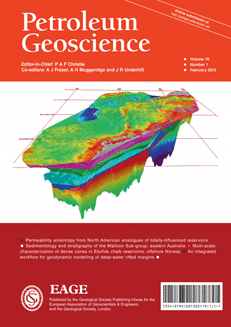
PETROLEUM GEOSCIENCE
Exploring Innovations in Oil and Gas ResearchPETROLEUM GEOSCIENCE is a prestigious journal published by the GEOLOGICAL SOCIETY PUBLISHING HOUSE, catering to the dynamic field of geosciences with a particular focus on petroleum exploration and production. With its ISSN 1354-0793 and E-ISSN 2041-496X, this essential academic resource has been at the forefront of research since its inception in 1995, and is set to continue leading through 2024. The journal has distinguished itself with impressive rankings, achieving Q1 statuses in categories such as Earth and Planetary Sciences (miscellaneous) and Geology, and Q2 placements in Economic Geology, Fuel Technology, and Geochemistry and Petrology for the year 2023. With high recognitions in Scopus rankings, including a 79th percentile in Earth and Planetary Sciences (Geology), it is an invaluable platform for researchers and professionals seeking to share their findings and stay updated on industry advancements. Although not an open-access journal, its rigorous peer-review process ensures that published articles contribute significantly to the ongoing discourse in petroleum geosciences, fostering knowledge exchange and innovation in the field. Researchers from across the globe consider this journal a vital venue for their work, enhancing its reputation and importance in the academic landscape.
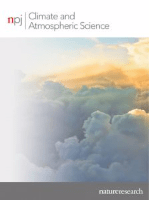
npj Climate and Atmospheric Science
Empowering scholars to address climate challenges.npj Climate and Atmospheric Science, published by NATURE PORTFOLIO, is a premier Open Access journal dedicated to advancing the understanding of climatic and atmospheric phenomena. Since its inception in 2018, this journal has positioned itself as a leader in its field, achieving Q1 ranking in 2023 across key categories such as Atmospheric Science, Environmental Chemistry, and Global and Planetary Change. With a Scopus rank of #23 out of 148 in Earth and Planetary Sciences and a commendable percentile ranking, npj Climate and Atmospheric Science serves as an essential platform for disseminating high-quality research, fostering interdisciplinary collaboration, and addressing critical global challenges. Its open access policy ensures that vital research findings are available to a broad audience, facilitating scholarly engagement and innovation. Researchers, professionals, and students in the fields of environmental science and climate studies will find this journal a valuable resource for cutting-edge studies and transformative insights.
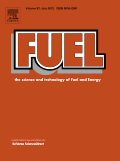
Fuel
Leading the Charge in Fuel Science and EngineeringFuel is a premier international journal published by Elsevier Science Ltd, showcasing critical advancements and insights in the fields of chemical engineering, energy engineering, power technology, and organic chemistry. With a significant history dating back to 1922 and continuous publication from 1970 to 2025, Fuel holds an impressive position in the academic community, reflected in its top-tier rankings—Q1 in multiple categories including Fuel Technology and Chemical Engineering for the year 2023. This journal is dedicated to exploring innovative research and application of fuel technologies, driving forward the dialogue on sustainable energy solutions. Researchers and professionals alike will find Fuel to be an essential resource, providing access to high-impact articles that contribute to advancements in methodologies and applications, while navigating the complexities of global energy challenges.

Carbon Letters
Leading the Charge in Energy Engineering.Carbon Letters, published by SPRINGER JAPAN KK, is a premier academic journal based in Singapore that focuses on groundbreaking research in the fields of Ceramics and Composites, Energy Engineering, Inorganic Chemistry, Materials Chemistry, and Organic Chemistry. With an exceptional reputation reflected in its 2023 category quartiles, which include Q1 rankings across multiple disciplines, this journal serves as a vital resource for researchers and professionals seeking to stay at the forefront of carbon-related studies and applications. Although it is not an open access publication, Carbon Letters facilitates the dissemination of high-quality research addressing contemporary challenges in renewable energy, sustainability, and environmental engineering, supporting the academic community's efforts in advancing science and technology. The journal has a robust converged period from 2014 to 2024, signaling its ongoing commitment to excellence in academia.

Carbon Capture Science & Technology
Innovating for Impact: Your Gateway to Carbon Capture AdvancesCarbon Capture Science & Technology, published by Elsevier, is an esteemed, peer-reviewed, open access journal dedicated to advancing research in the growing fields of chemical engineering, energy, and environmental science. With an ISSN of 2772-6568, this influential journal has established itself since its inception in 2021 and continues to make notable contributions, reflected in its impressive Q1 rankings across multiple categories, including a #14 rank in Environmental Science and a #13 rank in Chemical Engineering as of 2023. The journal aims to provide a platform for the dissemination of innovative carbon capture technologies and methodologies that address vital climate challenges, ensuring broad accessibility for researchers, professionals, and students alike. By embracing open access, Carbon Capture Science & Technology fosters a collaborative approach to knowledge sharing, making it an indispensable resource for those committed to sustainability and environmental preservation.
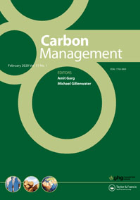
Carbon Management
Leading the Charge in Climate Change Research and PolicyCarbon Management, published by TAYLOR & FRANCIS LTD, stands at the forefront of research in the dynamic field of environmental science, particularly focusing on strategies and policies for effective carbon management in the context of climate change. With an ISSN of 1758-3004 and E-ISSN of 1758-3012, this esteemed journal has been an Open Access platform since 2022, allowing for greater dissemination of knowledge and engagement with crucial carbon-related issues. Housed in the United Kingdom, it boasts a commendable impact factor as evidenced by its Q2 ranking in Environmental Science (miscellaneous) and a notable Scopus rank of #65 out of 233 in General Environmental Science, placing it in the 72nd percentile among its peers. The journal's scope encompasses a broad range of topics, ensuring that it serves as a vital resource for researchers, professionals, and students alike, facilitating the exchange of innovative ideas and practices from 2010 to the present. By prioritizing open access, Carbon Management enhances visibility and impact in the pursuit of sustainable solutions for our planet's carbon challenges.
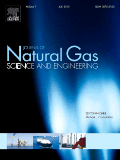
Journal of Natural Gas Science and Engineering
Championing Sustainable Practices in Natural Gas ScienceJournal of Natural Gas Science and Engineering is a prestigious peer-reviewed journal published by Elsevier Sci Ltd, specializing in the diverse interdisciplinary fields encompassing natural gas science, engineering, and technology. Since its inception in 2009, this journal has established a noteworthy impact in the domain, evidenced by its impressive rankings in Scopus, including a 93rd percentile for Earth and Planetary Sciences and a commendable 85th percentile for Energy Engineering and Power Technology. As an open-access title, it prioritizes the dissemination of high-quality research and advancements that drive the natural gas industry forward, making it essential reading for researchers, professionals, and students alike. Although coverage in Scopus has recently been discontinued, the journal continues to influence the academic landscape, fostering innovative discussions and solutions to contemporary challenges in natural gas production, processing, and utilization.
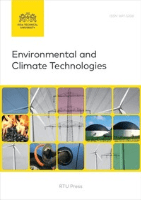
Environmental and Climate Technologies
Exploring Frontiers in Environmental Science and Renewable Energy.Environmental and Climate Technologies is a premier open-access journal dedicated to advancing knowledge in the fields of environmental science and renewable energy. Published by SCIENDO since 2009, this journal plays a crucial role in disseminating innovative research and interdisciplinary studies that address the pressing challenges posed by climate change and sustainable development. With its current positioning in the Q2 quartile for Environmental Science (miscellaneous) and Q3 for Renewable Energy, Sustainability and the Environment, it is recognized for its significant contributions to the academic community, ranking #107 out of 233 in General Environmental Science and #161 out of 270 in Renewable Energy. Hailing from Germany and operating under an open-access policy, Environmental and Climate Technologies ensures that research remains accessible to a global audience, fostering collaboration and discussion among researchers, professionals, and students alike. The journal invites rigorous scientific inquiries and practical solutions that can mitigate the impact of climate-related issues, making it a vital resource for those committed to environmental stewardship and sustainability.

Green Energy & Environment
Championing Open Access Research for Environmental Progress.Green Energy & Environment, published by KEAI PUBLISHING LTD, stands as a pioneering journal dedicated to the dynamic fields of renewable energy, sustainability, and environmental science. With its ISSN 2096-2797 and E-ISSN 2468-0257, this Q1 journal holds a noteworthy presence in academic discourse, reflecting its high-quality contributions within these critical areas of research. Launched in 2016, it has consistently embraced an Open Access model, facilitating unhindered access to research findings and fostering collaboration across global communities. Based in Beijing, China, this journal is dedicated to disseminating innovative insights that are essential for addressing urgent global challenges related to energy and environmental sustainability. Researchers, professionals, and students alike benefit from a platform that not only showcases pioneering research but also encourages interdisciplinary dialogue and knowledge exchange in the pursuit of a sustainable future.